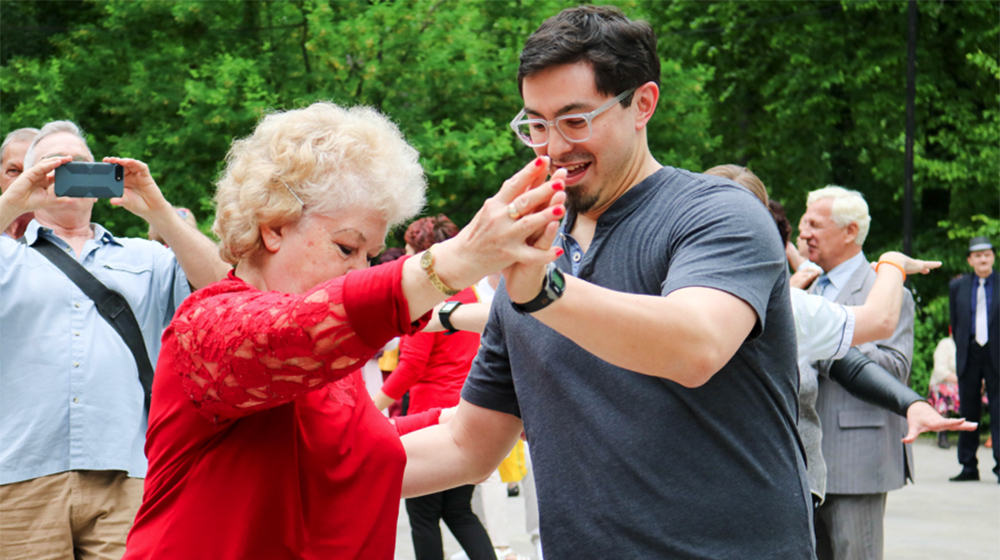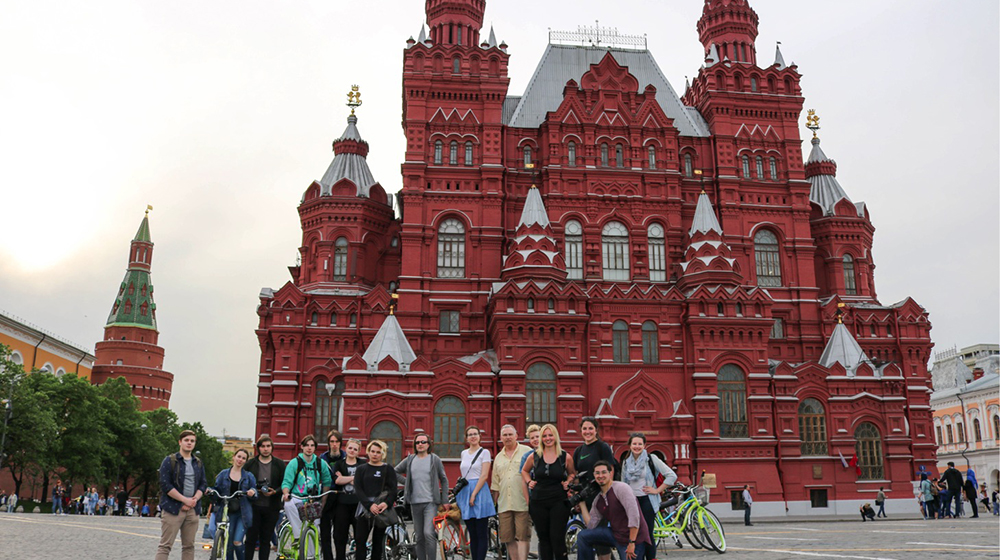From Russia With Love

| August 31, 2017 |
|---|
Five Loyola School of Communication film students got the opportunity of a lifetime to travel to Russia to collaborate on a documentary about Chicago and Moscow with Russian students from Moscow’s Institute of Contemporary Art. The project was funded by the Eurasia Foundation, allowing both Loyola and ICA students to travel to each other’s countries at virtually no cost.
Before I even came to Loyola, I always dreamed of studying abroad. But as my junior year was drawing to a close and I had yet to travel abroad, I was getting anxious. So when my Video Documentary professor, John Goheen said, “We have a grant to go to Moscow and collaborate on a documentary. Do you wanna go?” I responded, “Free trip to Russia? Sign me up.”
The location was not a typical Loyola study abroad destination, but it was abroad, wasn’t it? And opportunities like this rarely just fall into your lap; it was truly a right place, right time situation. I was excited for the chance to travel and to continue working on a project I’d spent the whole semester on. It wasn’t until I started telling my family and friends about the trip that the location became more significant. I had, of course, heard the buzz surrounding Russia in the news, but wasn’t concerned about my own travels once Professor Goheen reassured me it was perfectly safe.
But nonetheless, when I would tell friends I was headed to Moscow, the responses ranged from, “Are you going to uncover election hacking?” to, “Aren’t you worried about the Russian mafia?” (For the record, no definitely not, and well, I wasn’t until you brought it up.) My excitement turned to apprehension as I soaked in everyone else’s concern. Honestly, by the time I boarded the plane, I was truly nervous about what I had gotten myself into.

As soon as we landed I was grateful to find I was proven completely wrong. The stereotypes I’d been fed were just that, stereotypes. Moscow is a beautiful, vibrant, historic city and it welcomed us with open arms. With few exceptions, the people we encountered were kind, generous and helpful. One day we were out filming in the park when a police officer approached us. Initially, I was concerned we would be thrown out. He came over and said, “Can I help you all find something? If you’re looking for nice things to film there’s a historical reenactment over there.”

Our hosts, though, truly went above and beyond the call of duty to make us feel welcome and share their city with us. We got to sommerkart (scooter) down the river walk, ate potatoes in every conceivable way they could be prepared, and danced with babushkas in the park.

We certainly got to have some fun playing tourists, but we were there to work. This is where we encountered difficulties I hadn’t anticipated. As anyone who has ever done a group project can attest, working with others can be hard, and the more opinions you have the harder it is to find consensus. So you could imagine that with six of us and nearly fifteen of them, deciding on a direction for the film took a lot of back and forth. We were there to participate in a cultural exchange, but at our first meeting, the only thing that seemed to be exchanged was exasperated sighs from both sides.

What became symbolic of this gap in understanding because of cultural, language, and personal differences was this “Russian specialty food.” One of the Russian students, Misha, would tell us, “You must try a special Russian food, it’s green and crunchy.” “Is it green beans?” we would ask. “No, not that,” Misha would say, “like cucumber, but sour.” “Oh, so a pickle,” we realized. “No, no. It’s a cucumber, just sour.” “That’s a pickle,” we’d respond. “I don’t know what is pickle, I don’t think it’s that.”
We’d go in circles like this, both trying to help the other understand, but lacking the capacity to fully communicate what we meant. It was frustrating on both sides because we both honestly wanted to learn, but there was so much to overcome just to have a simple conversation. So eventually we’d half-heartedly smile and say, “It’s okay, it doesn’t really matter.”

Filming and conversing was much the same, slow and sometimes frustrating, but we eventually made progress. The earnest curiosity to learn about each other’s countries is what kept us talking, pausing to translate, and asking again.
We covered many topics, from pop music to skyscrapers. While most of the conversations were lighthearted, given the buzz, we couldn’t help but ask, “So what’s the deal with Putin?” Putting personal politics aside, one very enlightening thing came out of that conversation. Misha said to me, “We love your country; we think it is so beautiful. Your government is so beautiful and you have all these freedoms, you are so lucky.” I nearly did a spit take, “Ha! You must be joking.” “No, no, we are serious. We know nowhere is perfect, but you don’t realize how lucky you are. You can speak out, protest, impeach, we don’t have any of that.”
I was taken aback, but he was absolutely right. In the current political climate, you won’t find many raving about the “beauty” of our government, but I think we all need to be reminded of the immense privilege we possess as Americans. We are not perfect, not even close. But the perspective I was given reminded me that we at least have the opportunity to change things if we don’t like them. It was those small moments of understanding that fulfilled the purpose of our trip.
Slowly, but surely we came to understand each other better. We found points of common ground, shared our culture with them, and got back what we gave tenfold. They taught us how to say “I love you” in Russian, which sounds like “yellow blue bus” if you say it fast. We taught them that Americans don’t really eat hamburgers every day. And we made plans for all the places we’d take our newfound friends when they were to come to Chicago (they came for a week in late July).
By the end of the week, a real bond was forged, one that extended beyond any cultural divide. We learned in the end that we all live, as the Russians say, “under one sky,” the title of our upcoming film.
And on our final night in Moscow I finally got to try the ‘Russian specialty food’ Misha talked about. It was a pickle.

